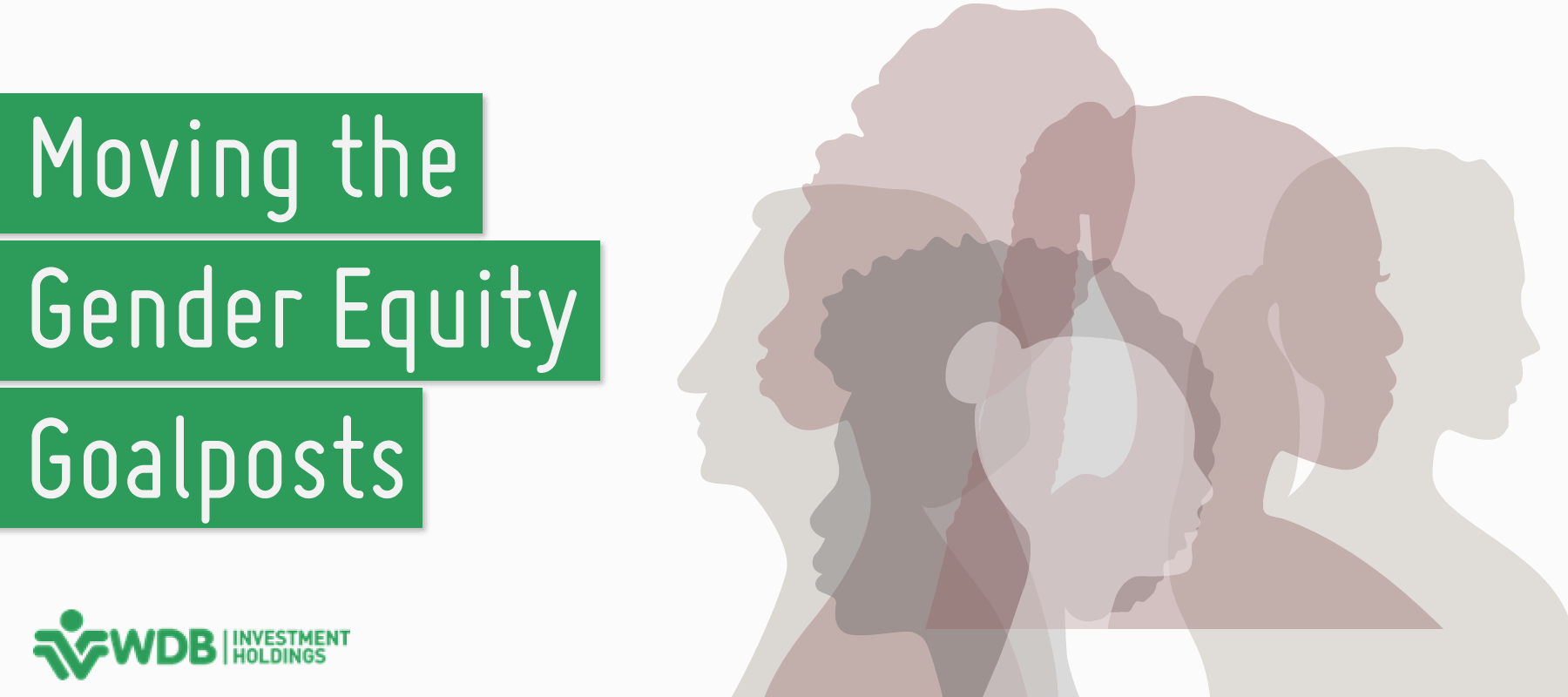Madumezulu “Girlie” Silinda has been heading up the WDBIH Women Leadership & Gender Pay Parity Catalytic Programme for over two years. It’s a powerful initiative advocating for a 50% target in the representation of women in key leadership positions in government and industry across South Africa.
Moving the Gender Equity Goalposts
February 2022

Madumezulu Silinda doesn’t hold back when it comes to issues that have deep meaning for her – such as gender equity in the workplace in South Africa. While gender equity targets have been set at 30% for years now, nothing has really changed, and for Madumezulu and the team at WDBIH, now is the time to look at the numbers and take action.
She says, “The Catalytic strategy is about campaigning for a 50% women target within leadership across all industries. The women in this country make up 50%– that is the equitable number.”
The CEO of WDBIH, Faith Khanyile, says, “We have been running this strategy for two years and it’s aimed at accelerating the meaningful participation of women in the economy. We are focusing on advocacy, and how we enforce and change legislation through the gender lens.”
The management team at WDBIH realised that effectively influencing government policy was a mammoth task and would only happen if two major things were first in place: i) sound research; and ii) powerful partnerships. Madumezulu came on board in 2019 to assist the team in addressing both issues.
Her first port of call was research. She worked closely with the University of Stellenbosch as well as commissioning a legislation review with Webber Wentzel on the Companies Act. In-depth internal research was done on policies around Broad Based Black Economic Empowerment (BBBEE) and the Employment Equity Act (EEA). A roundtable in partnership with ABSIP was held and input from a number of financial institutions also provided essential information. Insights into real “lived experiences” in the workplace added real value to the research component of the strategy.
“If you are going to approach government you need to have the support of solid evidence,” she says. “We looked at identifying the gaps and the weaknesses in the current legislation. This is a very critical part of the research,” she says.
Strength in Collaboration
While research is a key pillar of the Catalytic strategy, another key pillar is seeking out strong partnerships.
“It needs to be collaborative,” says Madumezulu. “At the level of coordination, you need very strong partners. In that way you make what you are doing so much more powerful. WDBIH partnered with IWFSA right from the beginning, and it has proved to be a critical and successful partnership because, by collaborating with IWFSA, we were already speaking to over a hundred very powerful, influential women who are passionate about gender equity.”
The JSE has also come on board to support primarily on research, as has various other women and professional organisations including UN Women, African Women Chartered Accountants, South African Women in Dialogue (SAWID), Black Business Council Women Alliance, SA Women in ICT, SA Women in Media, SA Women in Construction etc.
Madumezulu says there are many facets to the strategy and a very focused vision on getting results.
“The catalytic strategy is a mechanism for supporting women’s economic empowerment by influencing the legislation. You can then create a catalytic response via that legislation to be able to effect real change.”
On the Right Track to Gender Equity
At the end of 2021, WDBIH and Madumezulu put together a pre-launch campaign event that was well attended and the Catalytic campaign was very well received. The team looks forward to the official launch which will be announced in the first quarter of 2022, followed by a series of key events that will take place throughout the year including submissions of proposed changes to the legislation, advocating for a Gender equality Bill, working with companies to pledge taking women up for Board leadership, monitoring issues of gender pay gaps etc.
Madumezulu says there has been significant buy-in, but that the Catalytic strategy needs to be supported across the board. “We need proper champions and proper ambassadors of the campaign. We need people who do more than pay lip service to our goals and aims, those who will really take action. There has been enough talking and nothing has happened.”
She also understands the pitfalls of campaigns and initiatives and says that the WDBIH team is committed to the long haul in making 50% gender equity a reality.
“It is very easy for campaigns to be established and instituted, but sustaining a campaign requires guts. That’s means wearing that T-shirt every day to say 50%!”
Her personal motivation is a simple one.
“I have a belief that everyone should be and can be better. It’s possible that people can be helped and they can be better for their children and their families and for themselves. That’s what motivates me – the possibilities of a different future for all South Africans. And if you put economic power in the hands of women, we can really make a difference.”
Looking Ahead
While there is a long road ahead, and lots of work to be done in 2022, Faith Khanyile feels that finally WDBIH is on the right track to make real and meaningful change when it comes to the issue of gender pay gap and many other issues that fall under the gender equality banner in South Africa.
“The key success factor is the collaborative philosophy that we have adopted,” says Khanyile, “The Catalytic strategy is about taking action. Working as a collective, we are able to leverage off our partners’ contacts, experts and capacity. We are solutions-driven and action orientated. We are in partnership with government, and although there is a long road ahead, we are seeing positive developments.”
